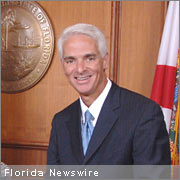TALLAHASSEE, Fla. /Florida Newswire/ -– Governor Charlie Crist today, as part of his ongoing commitment to education, visited John G. Riley Elementary School in celebration of Teacher Appreciation Week. Later today, during a roundtable discussion with the Clearwater Chamber of Commerce and while addressing the Florida Council of 100, the Governor is expected to highlight higher education reform legislation recently passed by the Florida Legislature.
 “Florida’s outstanding teachers have helped our state become one of the best education systems in the nation,” Governor Crist said. “We each should be grateful for the hardworking educators throughout Florida who are helping young people pursue their hopes and dreams for the future.”
“Florida’s outstanding teachers have helped our state become one of the best education systems in the nation,” Governor Crist said. “We each should be grateful for the hardworking educators throughout Florida who are helping young people pursue their hopes and dreams for the future.”
During his visit to Tallahassee’s John G. Riley Elementary School, Governor Crist recognized Florida’s teachers for their dedication and commitment to helping students prepare for the future. The Governor also congratulated the 4th grade students at the school for their excellent Florida Comprehensive Assessment Test (FCAT) writing scores, with 97 percent scoring at or above grade level. According to Education Week’s 2009 Quality Counts report released earlier this year, Florida’s schools have jumped from 31st in the nation in 2007, to 10th in the nation this year.
Later today, Governor Crist will hold a roundtable discussion with business leaders of the Clearwater Chamber of Commerce. He will also address the Florida Council of 100, a nonprofit, nonpartisan organization formed in 1961 to advise Florida Governors on key issues from a business perspective. Governor Crist is expected to thank the Florida Council of 100 for their help in passing Senate Bill 762 that strengthens Florida’s state university system. Their support, along with legislative leadership from Senator Ken Pruitt and Representative Will Weatherford, has helped reform Florida’s higher education system this legislative session. Governor Crist is also expected to highlight the impact Florida’s universities have on workforce training and strengthening Florida’s economy.
In November 2008, Governor Crist proposed a set of university system reforms aimed at strengthening Florida’s 11 state universities while also maintaining access and affordability for students and their families. Senate Bill 762 creates the reforms and allows the universities’ boards of trustees to charge a differential tuition fee of up to 15 percent, based on the needs of the university. To ensure the affordability of higher education, at least 30 percent of the differential tuition must be used for need-based student financial aid, or universities can waive the differential for financially needy students.
The boards of trustees must use the balance of the differential tuition for improvements in undergraduate education such as attracting and retaining top-notch faculty and researchers. The proposal also provides stability to the state university system by clarifying university governance at the local and state level, giving university boards of trustees authority over day-to-day operations and personnel while giving the Board of Governors power over longer-range planning.


